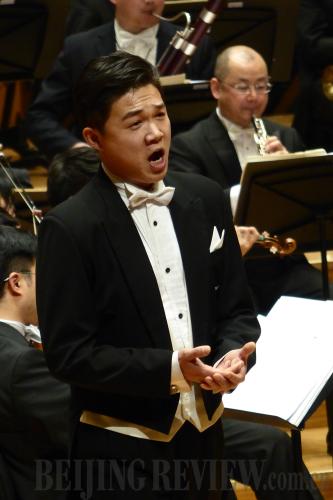|
 |
|
TENACIOUS TENOR: Wang Chuanyue on stage at the final round of opera discipline of the Sixth Beijing International Music Competition on November 13 (ZHANG YONG) |
Jiang, 55, a Shanghai native, started to play clarinet at age 15. He became the first Chinese clarinetist to have an international competition presence back in 1982 while he was teaching at the Central Conservatory of Music in Beijing. Although he was eliminated in the first round, Jiang won praise from Starke, who offered him a scholarship in Germany.
"I was lucky that I could seize that opportunity. Participating in the competition broadened my views and also changed my life," Jiang said. "I think holding an international competition in Beijing makes it easier for students of music in China to know about the level of world-class musicians."
"It would be better if Chinese contestants paid more attention to details, such as reading sheet music carefully to ensure that the melody and rhythm is played perfectly," Jiang suggested.
Similarly to Jiang, Zhou started play clarinet at the same age and also graduated from the Central Conservatory of Music in Beijing. The intensive rehearsing he did for the finals made his lip swollen, but he was satisfied with his first repertoire, Wolfgang Mozart's Clarinet Concerto in A major, K. 622.
"The gap between my foreign peers and me in relation to the clarinet is obvious. Their playing techniques and skills are more detail-oriented," said Zhou, who has several national awards under his belt. "I learnt a lot from this competition and also made friends."
Unlike those competing in the clarinet event, all the six opera final contestants were Chinese. "Part of the reason was because the competition notice we issued was too late to attract those who work at European opera houses," Zhang Yong explained. "It is hard for them to take time off because the finals were only three months away and during their peak season."
"To be honest, there are only two or three contestants qualified to work for middle-level or higher European opera houses," opera chair jury Cord Garben stated. "The shared problem for the contestants was the bad choice of songs. The aria they chose was often not suitable for their voice. Even worse, the French songs they sang were hard to understand due to their poor pronunciation."
Eyeing further
Creating a platform for young classical music talent from all over the world to shine was the initial idea behind the BJIMC, according to its initiator Zhang Yong.
Many renowned Chinese musicians such as Tan Dun, Li Yundi and Chen Sa are making a name for themselves through competitions. So far, more than 800 young musicians from over 50 countries have participated at the BJIMC, making it the largest classic music competition in Asia.
This year's event was supported by the Ministry of Culture and the People's Government of Beijing Municipality. The hosts were the China International Culture Association and the Beijing Association for Culture Exchanges, with Beijing Hefeng Art Foundation acting as joint host.
However, a lack of marketing caused issues for this year's event as holding two disciplines at a time was a challenge for Zhang and his team. "We had experience in holding a clarinet competition, but opera was brand new to us," Zhang explained.
According to Cord Garben, May and June are the best time for opera contestants as the period is during low season. Besides the matter of timing, European juries in the opera discipline also suggested ways to promote the competition locally.
"We, as juries, can promote the competition in our home country," Garben noted. "Contestants would be delighted if the juries are renowned in the discipline."
"Four years will be too long. I think it will be better if the opera competition could be held every year," Garben's German countryman Christoph Dammann suggested. "Opera competitions attract more contestants than other disciplines because it is easier to get a job offer through competitions."
"Winning awards does not necessarily mean winning fame. It is more like an encouraging symbol for young performers' potential career," Zhang said. "The BJIMC is not hold specifically for China but for the whole world. We are on the way to make it more attractive, and we are looking forward to getting more supports."
Prize Winners of the Sixth Beijing International Music Competition-Clarinet
First Prize: Unawarded
Second Prize: Unawarded
Third Prize: Wooyun Kim of South Korea and Anton Maiseyenka of Belarus
Fourth Prize: Sergey Eletskiy of Russia
Fifth Prize: Unawarded
Sixth Prize: Zhou Lei, Youjin Jung of South Korea, Narek Arutyunyan of Russia
Prize Winners of the Sixth Beijing International Music Competition-Opera
Male First Prize: Wang Chuanyue
Male Second Prize: Yu Yongzhao
Female First Prize: Unawarded
Female Second Prize: Wu Lihong
Female Third Prize: Liu Ying | 